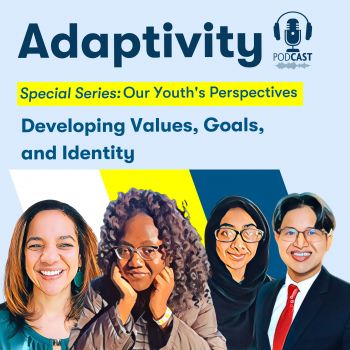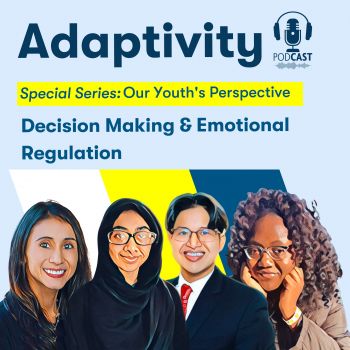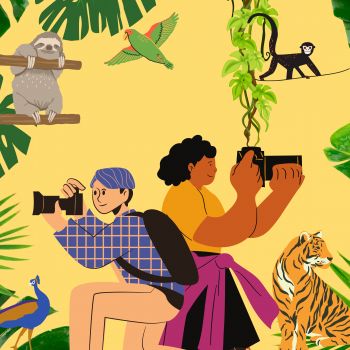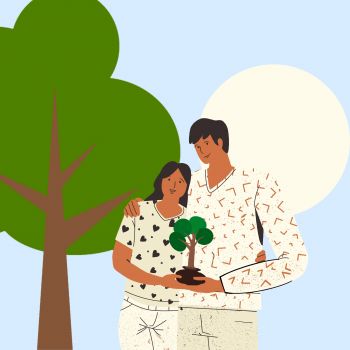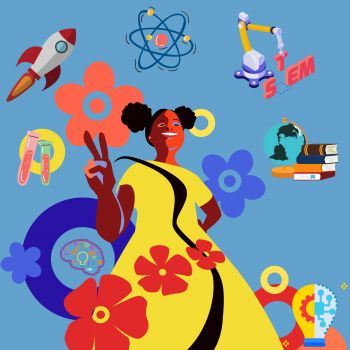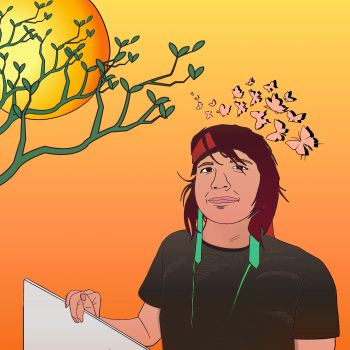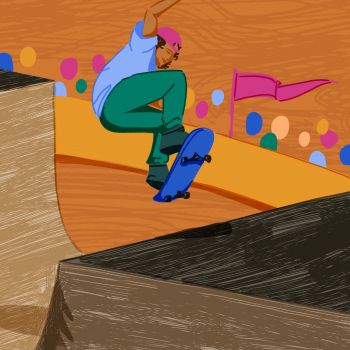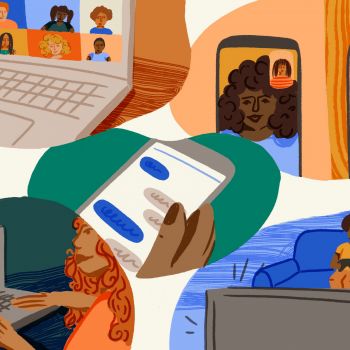Ron Dahl Part of learning during adolescence is giving yourself time and space to experiment and explore new friendships and new activities.
Michael Nguyen I now allow myself to enjoy baking and late-night car rides, those 3 a.m. rooftop talks, and just generally meeting new people.
Ron Dahl Teens have to evaluate both positive and negative risk taking. Sometimes that’s really difficult, while other times, the answer’s pretty clear.
Michael Nguyen You know, driving down the freeway at 100 miles an hour, like that’s not a matter of positive or negative risk-taking. That’s just being, you know, I guess, stupid!
Ron Dahl Healthy risk-taking and exploration are part of our journey of self-discovery as we grow into confident adults.
*****
Ron Dahl I’m Ron Dahl, founding director of the Center for the Developing Adolescent, and this is Adaptivity, where we explore the science of adolescence, untangling misconceptions about the years between childhood and adulthood.
We explore new insights into the rapid cognitive, emotional, and social changes that are happening during these years. And how the developing adolescent brain is primed to promote healthy and adaptive learning.
This is the second episode of a three-part series called “Our Youth’s Perspective,” brought to you by members of the Center’s Youth National Scientific Council on Adolescence.
*****
Michael Nguyen My name is Michael Nguyen, your guide through today’s discussion recognizing the importance of exploration and risk-taking.
Joining me are my wonderful co-hosts and fellow members of the Youth National Scientific Council on Adolescence.
Mahisa Mannan This is Mahisa again. It’s good to be back!
Tomi Dugbo And I’m Tomi. Hi, everyone!
Michael Nguyen Before we get started, One thing I want to emphasize is that when we’re talking about exploration and risk-taking, both are crucial aspects of our development that we should always actively employ: Explore the world, seek out your curiosities, go venture beyond the other side of that hilltop.
And when the risks and mistakes inevitably come, we need to make sure that we’re ready and able to reflect upon them as learning opportunities for us to become better versions of ourselves in our own personal arc of character development.
Tomi Dugbo It’s funny you say that, Michael, because isn’t there a saying “if we never do anything wrong, we’ll never get anything right”?
Michael Nguyen Hahaha, you’re absolutely right! Our mistakes can be some of our most deeply held insecurities, but the first step to overcoming them–and to address any issues, in fact, is to recognize that it exists, and so in whatever way is most comfortable to us, it’s important that we give ourselves the chance to own up to them.
Mahisa Mannan Well, were there any life lessons that you feel has had the most impact on how you currently are, Michael?
Michael Nguyen Wow, really putting me on the spot right now. But to answer your question, there actually is–and it’s a story I love sharing out loud because I’m able to learn just that much more about myself every time I do.
So, I’m a naturalized citizen. and, growing up being a first-generation, low-income immigrant, my mind was constantly fixated on this thought of you know, “How can I make sure that I don’t let the sacrifices that everyone has made for my own sake go in vain?”
I just always felt this need of constant acceptance, to the point where I never really had a personality of my own. I prioritized more tangible achievements and lived my life in strict adherence to what I believed those around me desired. And I can’t even say that I was always hiding who I was, because there was never really a “me,” just a persona that I hoped would allow me to best fit in with whoever I was around.
Superficially, it worked. You know, I was valedictorian, I became a state-ranked debater, and personally, I think I did some really good work for my community. But internally? Man, I was hollow. I didn’t give myself the opportunity to truly explore and take those healthy risks!
Mahisa Mannan Man, do you ever regret doing that, like, doing all the work that you put in?
Michael Nguyen Well, I don’t really regret all the work that I put in, because it got me to where I am today. But I think the, the methods that I went about to achieve what I did could’ve been more healthy. You know, I, I didn’t need to isolate myself in such a bubble to just get good grades and to just get those good internship opportunities, because I’ve been able to meet friends that you know, they were able to live their lives. And they were able to, you know, go out and hang out with their friends, go to the mall. And those were just opportunities I never allowed myself. And so if I had a chance, I would go back and change that aspect.
How about you guys? When was the point that you felt you were able to explore however you wanted?
Mahisa Mannan I think for me personally, I didn’t really explore until I was in college, because, when I was in high school, I had pretty strict parents. So, if I wanted to do something, or if I wanted to go somewhere with any friends, I needed their permission for every little single thing. And, they usually kept me home.
So, I really didn’t get to explore a whole lot of things until I was in college. I didn’t even dorm; I was still living from home. But I had more freedom; they gave me more freedom to see what I wanted. I joined a club, like a dance club, which I would never have done before, you know? And, I would stay out more late with friends, I would, like of course I was still a good student, I think, in college. But I really wanted the college experience. I didn’t really go to parties or anything like that, because I’m still very much an introvert, you know? But, I was, like, always hanging out with my close friends. I was always, like, trying out new things. Like, my friends took me hiking for the first time! I never would have done hiking on my own, you know? When you have those friends who help you explore what you want, I think that’s when it started all for me. Like, college was really the moment for me where I started exploring who I was as a person, and my own interests, and not worrying what other people thought of me.
Tomi Dugbo A time I was able to, or I felt like I was able to explore, is when I started high school, more like when I started being able to drive, I think that my parents gave me, like, a lot more freedom, knowing that I have a car to go around places. Especially living on the south side of Chicago, like it wasn’t that my parents wanted me to not go out and do things on my own, it was more of a safety thing. So when I started having my car and was able to, like, gain their trust that I’ll be okay, I think that’s when I started, I was able to start exploring more, and going out and trying new things, whether it was with my friends or by myself, things of that nature.
Mahisa Mannan So Michael, there’s obviously been a drastic change in how you go about the world, how did that happen?
Michael Nguyen Yeah, I’ve definitely gotten a lot better through a lot of self reflection and conversations. I now allow myself to enjoy baking and late-night car rides, those 3 a.m. rooftop talks, and just generally meeting new people. I realize that life isn’t just about achievements, but experiences; and the main lessons that you learn can’t just be quantified by grades, but can only be described by the journey you take and the people that you meet along the way. And I actually developed a little mantra to go along with those lessons.
Mahisa Mannan Ooh, what’s your mantra?
Michael Nguyen It’s just: I am perfectly imperfect
Mahisa Mannan I’m perfectly imperfect
Tomi Dugbo I’m perfectly imperfect
Michael Nguyen Yeah! Actually, since y’all already started, we might as well do it all together–
All I am perfectly imperfect.
*****
Michael Nguyen And on the subject of being perfectly imperfect, I wanted to re-introduce the host of the Adaptivity podcast, Dr. Ron Dahl, professor in UC Berkeley’s School of Public Health and the joint medical program. He is also the founding director of the Center for the Developing Adolescent.
Thank you so much for taking the time out of your day to join us, sir.
Ron Dahl Thank you. It’s a pleasure to be here.
Michael Nguyen So what words then would you have to give in regards to the core science that we are talking about today, which is exploration and risk taking?
Ron Dahl So these are such interesting and important issues, and the way you pose the question leads to a few thoughts. I think one is to try to shine the light on the positive side of these tendencies that young people have to try new things, explore, Basically do experiments in our interactions with other people about who we are and what kind of reactions we get. Those sound like, in a way, it’s kind of a corny way to describe what happens in a day to day way. And yet those really are the elements of learning, not just in terms of taking information and remembering it, but learning things about who we are and who we are in relation to other people and what kinds of approaches may build trust in what kinds of reactions and avoiding things. Because they’re uncomfortable, may prevent us from discovering connections or developing trust.
And so I think that this idea of promoting exploration and what people often think of as a negative thing, risk taking–and it’s true taking risks with physical dangers is an important source of health concerns for young people. And, if you step back and think about the range of ways that young people are exploring and taking risks, especially in the social realm, trying things, taking a chance with a new activity or a new relationship, or taking a risk to share one’s feelings or reveal something about your authentic self that feels vulnerable. Those are risky, positive examples of doing the same thing, taking a risk, trying something new that is shaping aspects of social learning that we all have to do.
Michael Nguyen So, I think in that regard, we can take it as you know exploration and risk taking goes hand in hand. You know, just the fact that kids like myself, we, I mean, humans overall are dynamic individuals. And so I don’t think it would make sense for us to be stagnant in our own experiences and never try new things. But I think a clear distinction that you made in risk taking was that there were positive and negative risk taking. But could you, I guess, go into more depth about it or redefine what healthy risk-taking looks like?
Ron Dahl Yeah, again, good question. And I want to be careful here because in some ways it can be hard to tell. In retrospect, we can say certain kinds of risk taking are positive and that, you know, going out for a play, making a new friend, trying a new activity, even taking an emotional risk. In retrospect, we can say, “Oh, that was a great learning experience that helped stretch us” or some developmental, developmentally positive thing. It’s not the case that every, every risk can be assessed as either good and safe or the negative version.
I think it’s much more of a framework for thinking about in a probabilistic way what the chances of this risk leading to learning and positive experiences and the chance of it leading to problems is something that we’re kind of assessing, not by doing careful analytic sentences: “This could happen.” “That could happen.” What’s chance, but rather we learn to get a feeling that that not just us, that makes us uncomfortable, start taking some kinds of risks and it makes us more likely to stop and think and other tendencies that can lead to being bolder and taking more risks, but may lead us to take, lean in a little too hard.
So I don’t in any way want to imply that if people are just really smart and careful, they can sort out: this is a good risk, this is a bad risk. But they can evaluate and learn from and become wiser about how to pay attention and make a judgment about whether it’s likely to be a good risk or not.
Michael Nguyen Should we not take the term “risk taking” too literal, I guess, in terms of it being every single thing that poses a risk? And what I mean by that is we should engage in, as you said, positive risk-taking behaviors. But then when we’re talking about negative risk taking and excuse my crass language, but we should just avoid doing stupid stuff, like we’re driving down the freeway at 100 miles an hour. That’s not a matter of positive or negative risk taking. That’s just being like a stupid.
Ron Dahl Yes. I like that, I like the way you describe that. Yeah, we should avoid being stupid.
And we kind of smile when we say that because we realize the absurdity, because there is some level at which when you step back from the moment, at something you did you say, well, that was stupid. That was just, you know, it was outside the range. And yet in the moment, it may not feel that way to the person. Or it’s interesting to think about why someone did at that moment not see that it was stupid or feel that it was stupid and what might help us have better judgment in those situations in the future.
And I would also say that we don’t need to be sticklers about terminology or defining exactly what we mean to talk about behavior and risk. But it is important to do that when we’re talking about the science that informs it, because we can use words different ways and different words and concepts can help some people understand this differently. But the place where the precision becomes important is when we’re trying to go from the science to what does it mean? And that’s part of the reason for slowing down, because there’s a lot of research right now going on about how young people, adolescents in particular, may be really good at learning under high-uncertainty conditions. And most of what we deal with in our adolescence and the complex and–certainly adolescents growing up now–the complexities of the decisions and the social situations and the ambiguities are so, so large.
And so even if adolescents are in some ways, you know, their brains are a bit better at learning under really rapidly changing, uncertain conditions, it is still really difficult and uncomfortable.
There’s another part of the decision making that people have been shining some light on for some time, and that is that sometimes there are competing consequences or feelings about the fork in the road.
For example, let’s say someone is about to, who is potentially taking an impulsive, risky behavior that could easily be evaluated as stupid. Whether that’s experimenting with a dangerous drug or really dangerous driving, let’s say it’s something in that category. But in the moment, the possibility of, in certain peer group situations, doing something that’s embarrassing or feeling humiliated, that can feel more powerful than the knowledge that something’s physically dangerous.
But the ability to think about something down the road or that could happen later or it’s something that’s more abstract, it’s hard to have that feel as salient, as, as relevant in that moment. And so I think part of this process of developing judgment and evaluation involves some mixture of careful thought and feelings and some experience about evaluating when it’s important to slow down and think, and realize that that’s a stupid thing, and when to recognize that sometimes the feeling that it’s too dangerous is really more just some distress about trying something new or discomfort with uncertainty.
Michael Nguyen Thank you so much for our entire discussion today. You know, it’s really important to clarify what we’re talking about when we’re talking about exploration and risk taking.
Ron Dahl Oh, thank you; this was a great discussion. It went into a lot of very interesting issues and a chance to reflect on these questions. It’s been a great, great discussion!
******
Michael Nguyen That was Dr. Ron Dahl, founding director of the Center for the Developing Adolescent and professor in UC Berkeley’s School of Public Health and the joint medical program.
I’m Michael Nguyen. Thank you for listening to Our Youth’s Perspective. I hope you have a lovely day!
******
Tomi Dugbo Hey, this is Tomi. next in our 3-part series, ‘Our Youth’s Perspective,’ you’ll be hearing from me about developing values, goals, and identity.
******
Ron Dahl I’m Ron Dahl, and this has been a special episode of adaptivity from the center for the developing adolescent.
We’d like to thank Michael Nguyen, from the Center’s Youth National Scientific Council on Adolescence for sharing his experience with us. Thanks also to fellow council members Mahisa Mannan, and Tomi Dugbo.
For more on the developmental science of adolescence and the YNSCA check out our instagram @develadolescent.
You can also visit us at adaptivitypodcast.org or share your thoughts through our website.
Our podcast is produced at UC Berkeley for the Center for the Developing Adolescent. Our senior producer is Polly Stryker, our producer is Meghan Lynch Forder, and our engineer is Rob Speight. A special thanks to Ahna Suleiman and Xochitl Arlene Smola for their facilitation of the YNSCA projects.
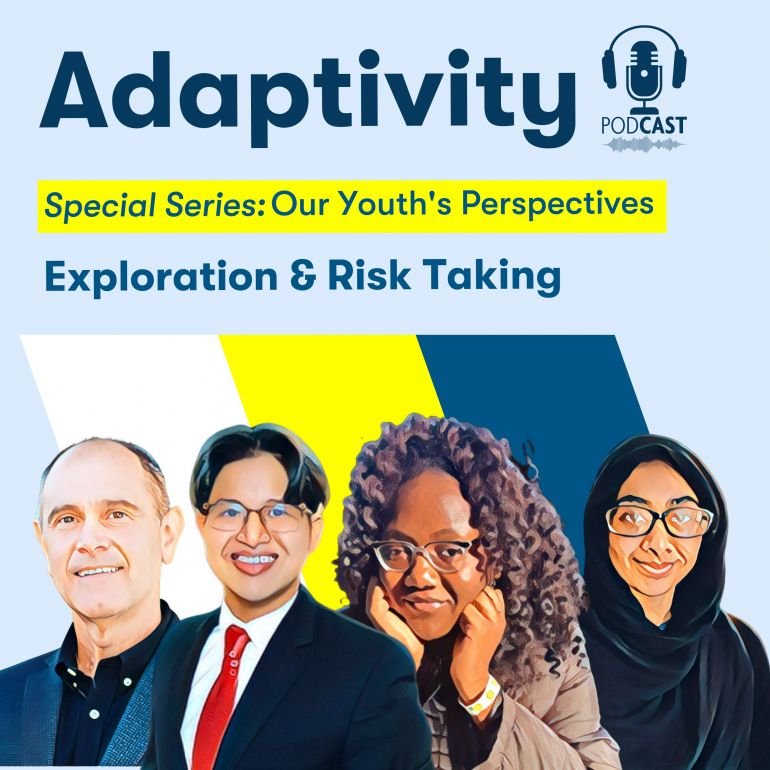
_350_350_80_c1.jpg)
_350_350_80_c1.jpg)

